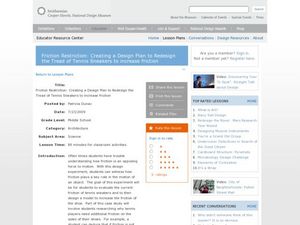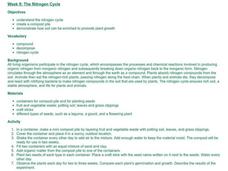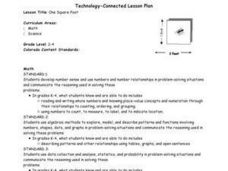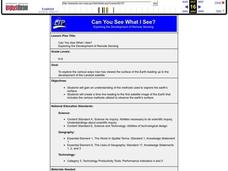Curated OER
Dinosaur and DNA Days
Biology stars extract DNA samples from beef thymus and then examine its properties. They use enzymes to digest the DNA samples, and then use electrophoresis to separate fragments. Finally, they discuss methods and principles of...
Curated OER
Modeling Mania Math Topic: Using Models
Students examine problem solving techniques when working on spatial problems. They discover how models, sketches, and drawings can be used to understand on something works. They design a model of a bridge using given dimensions and...
Virginia Polytechnic Institute and State University
Lesson Plan: Omelet Cooking Principles
Although designed for a foods lab, the information in this resource might be just the thing for your own recipe notebook. Illustrated, step-by-step directions for making the perfect omelet, egg-citing puzzles, games, and even...
NOAA
Wet Maps
How do oceanographers make maps under water? Junior explorers discover the technologies and processes involved in creating bathymetric maps in part three of a five-part series designed for fifth- and sixth-grade pupils. The lesson...
Curated OER
Design your own Water Temperature Experiment
Young scholars use Robolab sensors and software to design an experiment that incorporates the use of temperature probes. They conduct the experiment, complete a lab sheet, evaluate the results and then consider if their hypothesis...
Curated OER
What Boat Designs Float the Best?
Fifth graders investigate buoyancy by conducting a science experiment. In this water properties lesson plan, 5th graders predict which of their different paper boat designs will float for the longest period. Students conduct...
Curated OER
The effectiveness of Antacids
High schoolers design and conduct a scientific experiment to test which of four antacids would be most effective for neutralizing acids. They rank the antacids in order from most effective to least effective and explain how they...
Curated OER
Friction Restriction: Creating a Design Plan to Redesign the Tread of Tennis Sneakers to Increase Friction
Young scholars evaluate the friction of tennis sneakers and redesign them to increase friction. For this physics lesson, students calculate starting, sideways and forward stopping friction. Using quantitative data, they prove that...
Curated OER
Questions About Rivers
Students investigate rivers. In this geography lesson, students work in cooperative groups to read about rivers from articles they have collected. Students form questions using Bloom's Taxonomy as a guide.
Curated OER
Potential and Kinetic Energy
Sixth graders explore potential and kinetic energy. In this science lesson, 6th graders assume the role of a roller coaster engineer and design a roller coaster. Students use their knowledge of kinetic and potential energy to design a...
Curated OER
The Nitrogen Cycle
Students design and create a compost pile in order to study the Nitrogen Cycle. They then use the scientific method to determine if plants grow better when they add organic matter from their compost pile to the plant's soil.
Curated OER
Electromagnets
Students improve their science skills by designing an experiment for the relationship between electricity and magnetism. In this science skills instructional activity, students discuss the scientific method and use the given materials to...
Curated OER
Scientific Problem Solving
In this problem solving worksheet, students will conduct an experiment to answer this question: "How does watching too much television affect us?" Students will form a hypothesis, collect data, analyze their data, and draw a conclusion....
Curated OER
Build Your Own Hovercraft
Learners construct a hovercraft following specific procedures. In this technology lesson plan, students explain the physics principles behind hovercraft. They compare and contrast this machine with the aircraft.
Curated OER
Gravity Versus the Mighty Egg
Students design, revise and construct a method for protecting an egg from cracking when it is dropped from a height. They work in small groups to develop their protection method and then collect and analyze data as a class when each...
Curated OER
Tie Dye
Students practice writing research proposals to test the color fastness of a dye once it has been exposed to a t-shirt. Each proposal needs details of experimental design, length of treatment, and means of cleaning the shirt. All...
Curated OER
Scientific Inquiry: Periodic Motion
Young scholars construct their own pendulum. In this physics lesson, students design an experiment to find the factors affecting its period. They formulate a conclusion based on experimental data.
Curated OER
One Square Foot
Learners identify, describe, count, tally, and graph life found in one square foot of land.
Curated OER
Preparing for the New Haven Public School Science Fair Through Environmental Science
Students discover what type of effect that pesticides have on earthworms. They use three different types of pesticide and examine the external and internal effects that each have on earthworms. They maintain earthworms in habitats...
Curated OER
What's the Attraction?
Learners experiment with magnets to determine the distances at which they attract and repel each other.
Curated OER
Can You See What I See?
Learners gain an understanding of the methods used to explore the earth's surface. Students create a time line leading to the first satellite image of the Earth that includes the various methods utilized to observe the earth's surface.
SeaWorld
Polar Animals
Young scientists explore some of the scientific equipment that is used by explorers during expeditions to the North or South Pole. Then, they have a relay race! All of the equipment is lined up at a spot 25 yards away from the lines. The...
Curated OER
Literacy Lesson: Guided Reading
Here is a wonderful lesson designed for young scholars with special needs. This well-thought-out lesson uses Big Books, familiar stories, and has a lot of review learning built into it. The book, The Keeping Quilt is used in the main...
Curated OER
Changing Ramp Heights
Students conduct an experiment to determine how the change in ramp height affects the distances a ball is able to move a stationary cup. Data is collected from several trials and recorded and analyzed.























